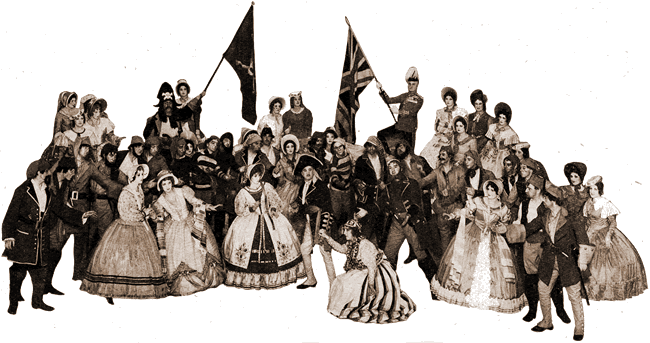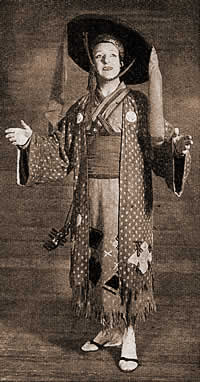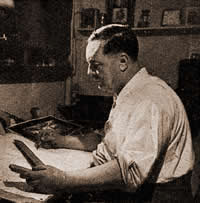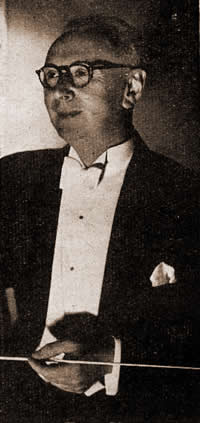 |
 |
||||||
—the man who has sung his way through thirty-three years, and is willing to start all over again tomorrow

The finale of Act 1 of The Pirates of Penzance, with Darrell Fancourt
as the Pirate King and Henry Lytton as Major General Stanley.
 |
| Majestic and impressive, Darrell Fancourt as he appeared when playing Colonel Calverley in Patience. |
This month, at the end of the Sadler's Wells season, the D'Oyly Carte Opera Company will lose one of its finest artists and most popular figures; the best Mikado the Company has had in my long memory; the subtlest Dick Deadeye; the man whose singing of The Ghosts' High Noon has been largely responsible for keeping the once-neglected Ruddigore in the repertoire. Darrell Fancourt is retiring from the Company at the age of 62. "Not that the old voice isn't as good as ever it was," he tells you, demonstrating with a tone and volume that almost blows you clean out of the room. But his doctors have advised him that after 33 years of touring he needs a rest. And after one or two serious breakdowns in recent months, he is reluctantly inclined to share their view. He doesn't intend to sit at home and do nothing, though. He hopes to continue with concerts and radio work. And he has been heard to observe to a curious stranger who wanted to know what would happen when the full copyright of Gilbert and Sullivan expires, " Madam, I shall take out my own company and sing all the juvenile parts myself. After all, I shall only be sixty-eight." Stranger things have happened in the world of opera.
Darrell Louis Fancourt Leverson joined the D'Oyly Carte Company in May 1920. He had no intention of making Gilbert and Sullivan opera his career. In his schooldays at Bedford he was almost entirely preoccupied with sport. (He stayed on a year longer than was usual because he wanted to get his rowing cap.) If he cared much for anything else at that time, it was singing. " My mother," he says, " sang beautifully as an amateur. My father played the violin very badly, but he loved singers." (His father's sister married Brandon Thomas, the author of Charley's Aunt.) Young Darrell was sent to Germany to stay with friends, and a German tutor was engaged to fill in the gaps in his education. "I soon learnt that if I plied my tutor with enough beer, I was free for the day. I managed to play a lot of tennis." But tennis or no tennis, he still wanted to learn to sing. He got an introduction to Lilli Lehmann, one of the greatest teachers in Berlin. Mme. Lehmann listened to his voice. At the end of the audition she said briefly, "Herr Leverson, do you know how badly you sing?" "Yes, gnädige Frau," replied Herr Leverson. "Ach so, gut," said the great lady. "Then there is some hope for you."
For the next two and a half years Darrell Fancourt studied with Lilli Lehmann, under the direct tutorship of one of her ex-pupils, a bass at the Berlin Opera. Returning to England, he won a scholarship to the Royal Academy of Music, worked for six years under Dr. Theo Lierhammer, and met a lovely black-eyed Welsh soprano, Eleanor Evans, whom he later married. Then came World War I; after that a few concerts, and a short season at Covent Garden. This, although he didn't know it, was the moment of fate. The agents said, "Times are bad. There's nothing doing at the moment. But the D'Oyly Carte Company wants a bass. Why not try it for a couple of years, till things settle down?" So Darrell Fancourt tried it; his wife joined him as, at first, a chorus soprano; and there they have both remained for more than a quarter of a century.
This is the point at which I can take up the story personally. In the spring of the following year, 1921, the D'Oyly Carte Company arrived, as its custom was, in Manchester. At that time I was a new, gauche, and aspiring provincial journalist with an overwhelming passion for Gilbert and Sullivan. Our regular music critic on the Manchester Guardian, the late and great Samuel Langford (whose hobby was the culture of delphiniums), was occupied one evening with a concert assignment. Somebody had to review The Yeomen of the Guard, and it fell to the lot of me, the new girl.
 |
Derek Oldham, the famous tenor, appearing as Nanki-Poo in The Mikado |
I can remember as clearly as if it were yesterday the pains I took over that review (re-reading it now, on yellow faded paper, for of course I kept it, it was a very jejune and meagre little effort). I can remember even more vividly the salutary lesson in humility I received when I showed it to the music critic. "Will it do?" I asked him in trepidation. " Oh, it'll do all right," was his kindly answer. "You needn't worry. If they don't see my initials at the bottom, they won't read it."
"They," meaning the public, probably didn't, but the Company did. I have since learnt that my awkward, prentice effort created quite a little storm. For it seems that, out of sheer ignorance, I had praised a part it was not customary to notice at all—that of Sergeant Merrill, played by a newcomer called Darrell Fancourt. There was another newcomer to the Company whom I also praised, a local Lancashire tenor named Derek Oldham, who sang the Fairfax in The Yeomen of the Guard, and was fluttering all the young girls' hearts in Manchester at the time with his Nanki-Poo, his Ralph Rackstraw in H.M.S. Pinafore, and his Marco in The Gondoliers. (Gilbert and Sullivan fans have never been conspicuous for fainting in the aisles, but I assure you that when Derek Oldham prepared to sing Take a Pair of Sparkling Eyes, he was greeted with a swooning hush that Donald Peers and Frank Sinatra would have envied.) Since we were all of us young, all enthusiastic, and all trying very hard, it wasn't too difficult for friendships to be established on a basis that has stood the wear and tear of seasons.
 |
Harry Haste, stage staff head and oldest surviving member. |
 |
Isidore Godfrey, conductor to the company for 25 years |
Derek Oldham stayed on with the D'Oyly Carte Company for several years, during which he came to be recognized as "the best thing we've ever had in the tenor line, full of kindness and enthusiasm, with an amazing charm." He left to appear in London in musical comedy and operetta; the years have changed the type of rôles he essays, but never abated the charm. Eleanor Evans was quickly picked out of the chorus to sing the Plaintiff in Trial by Jury, Fiametta in The Gondoliers and Lady Psyche in Princess Ida. In her time, she has understudied all the principal soprano parts, taught voice production and stage technique to one newcomer after another. In the past five years she has been fully employed as official producer to the Company.
Darrell Fancourt, who now rates the No. 1 dressing-room wherever he goes, has outlasted all his contemporaries in the Company, and a large number of his successors. He claims to be the oldest surviving member by many years; barring Harry Haste, the head of stage staff, who got in a year ahead of him. Next in priority (apart from Mrs. Fancourt) comes Isidore Godfrey, the conductor, with a record of twenty-five years. He is married to a comparative babe, Ann Drummond-Grant, who changed from soprano parts to the heavy contralto rôles. ("She would have been a most glorious Wagnerian soprano, but she is one of the very few people who have sung the contralto parts in Gilbert and Sullivan, not as hard beastly women, but with a true understanding of their light and shade.") The modern D'Oyly Carte Company is predominantly young. It is reported that Bridget D'Oyly Carte, the current dea ex machina, observed that she "couldn't bear to look at ugly faces any more." The female chorus is composed of—
All very agreeable girls and none
Is over the age of thirty-one.
The same rule applies (approximately, m. and f.) to, the principals.
If you ask Darrell Fancourt to what he attributes the longevity of his voice, he'll tell you simply, "Basic training. In the matter of singing," he says, "you've got to go to school and learn. It takes a long time to learn, but once you've learnt you don't forget. One of the most essential things to learn is how to relax. With perfect relaxation, no matter how old you are, no matter how much you are required to do, you can't hurt your voice. You can strike a note like that" (demonstration) "or sing legato like that" (demonstration) "or make your voice sound like a church organ like that" (another and even more impressive demonstration).
This article appeared in an unknown magazine in July 1953. It has been added to the Archive to mark the sixtieth anniversary of Darrell Fancourt's death on 29 August 1953.
The D'Oyly Carte Who Was Who entry for Darrell Fancourt.
Page modified 28 August 2013